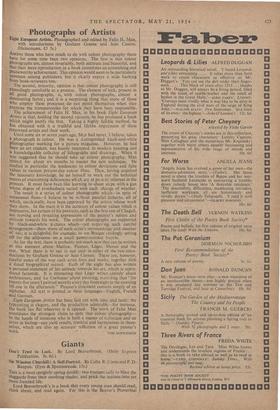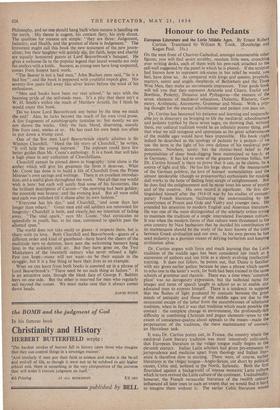Giants
THIS is a most sprightly spring double: two trumpet calls to blast the sluggards from their soothing shades, and prick the zealous into yet more frenzied life.
Lord Beaverbrook's is a book that every young man should read, think about, and read again. For this is the Beaver's Proverbial Philosophy, and no one should hang back when success is handing on the torch. His theme is cogent, his content fiery, his style direct. The qualities for success are simple: "they are three: Judgement, Industry, and Health, and the greatest of these is Judgement." The 'irreverent might call this book the new testament of the new journ- alism; but their laughter will quickly die, for faith, hope and charity are equally honoured guests at Lord Beaverbrook's banquet. He gives a welcome lie to the popular legend that laurel wreaths are only for smilers with a knife. Success, as young men have long suspected, comes from honest hard work.
"The Beaver is not a bad man," John Buchan once said, "he is a bad boy"; and the book is peppered with youthful impish glee. His seventy-five years fall away like silver leaves before the wind of his enthusiasm.
"Men and books have been my real school," he says with the beaming pride of the self-made man. It's a pity that there isn't a W. H. Smith's within the reach of Matthew Arnold, for I think he would enjoy this book.
Do we know Lord Beaverbrook any better by the time we reach the end? Alas, he lurks beyond the reach of his own vivid prose. A few fragments of autobiography tantalise us: but mostly we are not shown the works. Only the face, bland, disarming, suavely free from cant, smile& at us. He has read his own book too often to put down a trump card.
One of the 'few men Lqrd Beaverbrook clearly admires is Sir Winston Churchill. "Heed the life story of Churchill," he writes, "It will help the young aspirant." The aspirant could have few better guides than Mr. Coote's anthology. It is a book that will take a high place in any collection of Churchilliana.
Churchill cannot be pinned down in biography : time alone is the amber which will give his greatness the form it deserves. What Mr. Coote has done is to build a life of Churchill from the Prime Minister's own sayings and writings. There is an excellent introduc- tion, and a useful gloss throughout the work. Not all that one would wish is here: but each will surely find- some. of his favourites, like the brilliant description of Curzon—" the morning had been golden; the noontide was bronze; and the evening lead. But all were solid and each was polished till it shone after its own fashion."
"Everyone has his day," said Churchill, "and some days last longer than others." Great men and old soldiers are renowned for longevity: Churchill is both, and clearly has no intention of fading away. "The vital spark," says Mr. Coote, "that coruscates so splendidly in youth, has, in his case, continued to sparkle past the allotted span."
The world does not take easily to giants: it respects them, but is chary with its love. Both Churchill and Beaverbrook—giants of a different order and kind of gianthood—have heard the cheers of the multitude turn to derision, have seen the welcoming banners hang limp in the suddenly still air. But they have gone on, the Two' Musketeers of the twentieth century who never refused a fight. Few can hope—many will not want—to be their equals in the struggle; but it is a fine thing to have their lives as an example.
What we can learn from both books is summed up in a phrase of Lord Beaverbrook's: "There need be no such thing as failure." It Is an attractive coin, though the bleak face of George F. Babbitt leers on one side. But the other is reserved for men who regularly sail beyond the sunset. We must make sure that it always comes down heads.
DAVID STONE



































 Previous page
Previous page